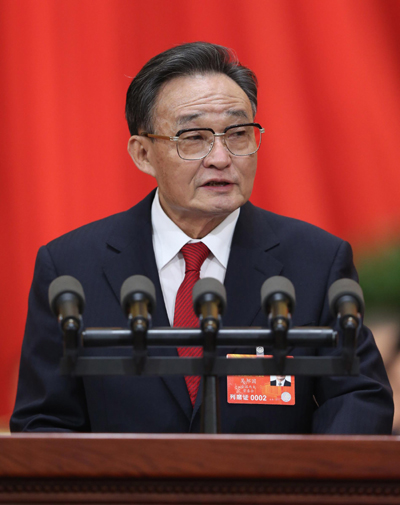Laws on key issues to be amended
Updated: 2013-03-09 06:51Cao Mingde, an environmental law professor at China University of Political Science and Law, said he hopes the second reading can take in a suggestion to allow more public involvement in promoting a green and low-carbon society, especially in rural China.
Alecken Eminbahe, chairman of the Standing Committee of the Xinjiang People's Congress, said revision of the environmental code is a move to answer public concerns, which reflects the principle of coordinating legislative work with ongoing major issues in society.
 |
|
Top legislator Wu Bangguo delivers an annual work report to NPC deputies in Beijing on Friday. [Photo/Xinhua] |
"There seem to be more violent cases in kindergartens and primary schools in recent years, but there's no special law for campus safety," she said.
Apart from legislative work, Wu said the NPC also plans to ask the State Council to deliver reports on issues of high social awareness this year, such as urbanization and anti-graft work - the two priorities that China's new leadership has emphasized to drive economic growth and promote political integrity.
Hu Zhongxiong, mayor of Yiyang city in Hunan province and an NPC deputy, said the top legislature has greatly improved supervision over the government in the past five years by conducting hearings on some issues of widespread concern. But he said he believes such supervision can be further enhanced by introducing questioning of government officials.
Experts said hearings and questioning are legal means by which people's congresses oversee governments, courts and procuratorates. Hearings are "mild", but questioning can be very harsh, usually with criticism, they said.
The top legislature started its first hearing on State Council officials in June 2010 on fiscal and taxation issues. So far it has conducted nine hearings.
"With experience accumulated in the nine hearings, I think it's time to adopt stronger supervision measures, such as questioning," Hu said.
Cui Jia, Zhu Zhe and An Baijie contributed to this story.
zhaoyinan@chinadaily.com.cn


